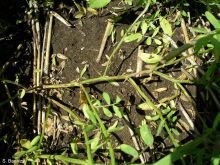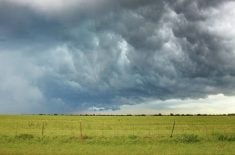Ralph Goodale’s skilful tactics in managing the Canadian Wheat Board file through most of the 1990s were decisive in reversing the anti-monopoly momentum he had inherited from the previous government, says an academic analysis of the CWB’s transformation.
University of Toronto political scientist Grace Skogstad credits Goodale with being “strategically adroit” as he developed policies that changed the wheat board in response to criticisms, but left its core monopoly power intact.
The Canadian government has now agreed to an agenda at World Trade Organization talks that will reduce board options to underwrite export sales and make its monopoly a matter of negotiation. Goodale, now finance minister, no longer is responsible for the wheat board file.
Read Also

Saskatchewan Co-ops to acquire Blair’s locations
Blair’s Family of Companies will be turning over the operation of six ag retail locations in Saskatchewan to local Co-ops
Skogstad first presented her findings to a Winnipeg conference and aims to have them published in an academic journal.
One of Goodale’s key strategies was playing for time to allow the wheat board and its supporters to develop their defences, she said.
“To me, it makes all the difference in the world as to how it turned out that Goodale came in believing in the wheat board,” Skogstad said in an Aug. 19 interview.
“He proved himself very skilful in managing the file to produce the results he thought best.”
She said Goodale was motivated by a belief that the board monopoly powers helped extract better returns from the market for farmers, that the majority of farmers supported the board and, in particular, that it was popular in his home province of Saskatchewan.
When he inherited the CWB file along with the agriculture minister’s job in November 1993, the momentum was with the critics and the prairie farm community was in turmoil over the issue, she wrote.
Former Conservative minister Charlie Mayer had removed barley from the CWB monopoly (a decision later overturned by the courts) and board critics were gaining strength as “a vocal minority of western Canadian grain growers clamoured for a dual market for barley export sales.”
This vocal minority was supported by the Alberta government and the Reform Party.
Goodale played for time.
He established the Western Grain Marketing Panel to hold hearings, prompting the board and supporting academics to produce reports claiming a market gain because of the CWB monopoly.
When the panel proposed an end to the monopoly on barley exports, Goodale’s response “was crucial to the eventual outcome of the controversy,” wrote Skogstad.
He asked farmers to comment, giving board supporters time to organize and to claim the panel had not listened to farmers.
He implemented some wheat board reforms recommended by the panel, including farmer election of a majority of directors and allowing the board more flexibility in pricing options.
And he called a 1997 plebiscite on the barley marketing issue, offering farmers a stark choice between monopoly or no board involvement.
Goodale insted there would be no third “dual Market” option because he did not believe it would work.
Monopoly supporters cast almost two-thirds of the votes.
Skogstad said Goodale was aided by the wheat board understanding that it would have to become more flexible in some policy areas if it wanted to preserve the monopoly.
But Goodale was key in framing the question to be debated, encouraging board supporters to organize and then delaying decisions until they had the required time.
“In short, on the path that began with the wheat board challenge and ended with its retention but transformation, there were forks at which, had different authoritative actors been present or the same actors pursued different goals and strategies, the outcome could have varied … most obviously the wheat board could have been stripped of its marketing monopoly,” Skogstad wrote.
















